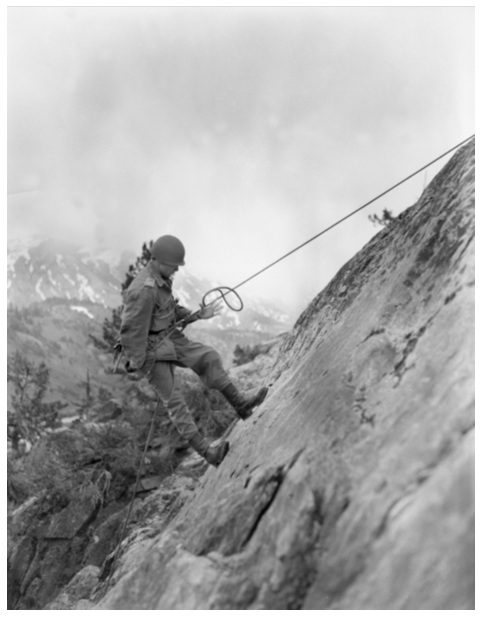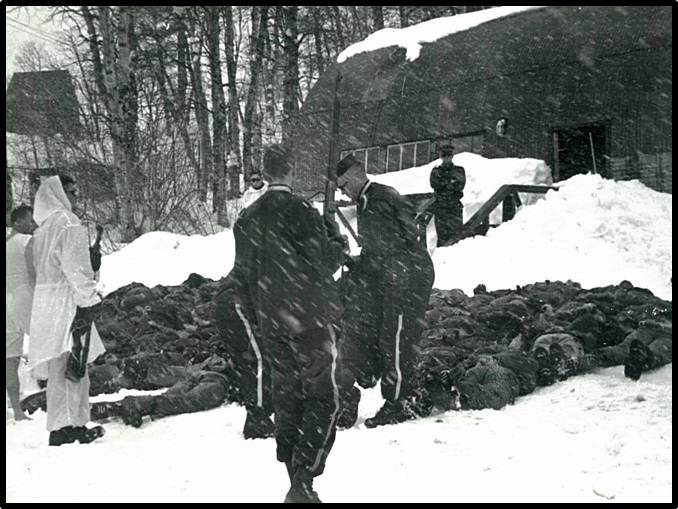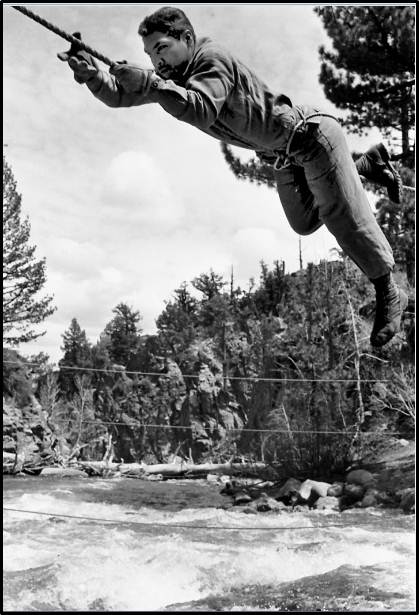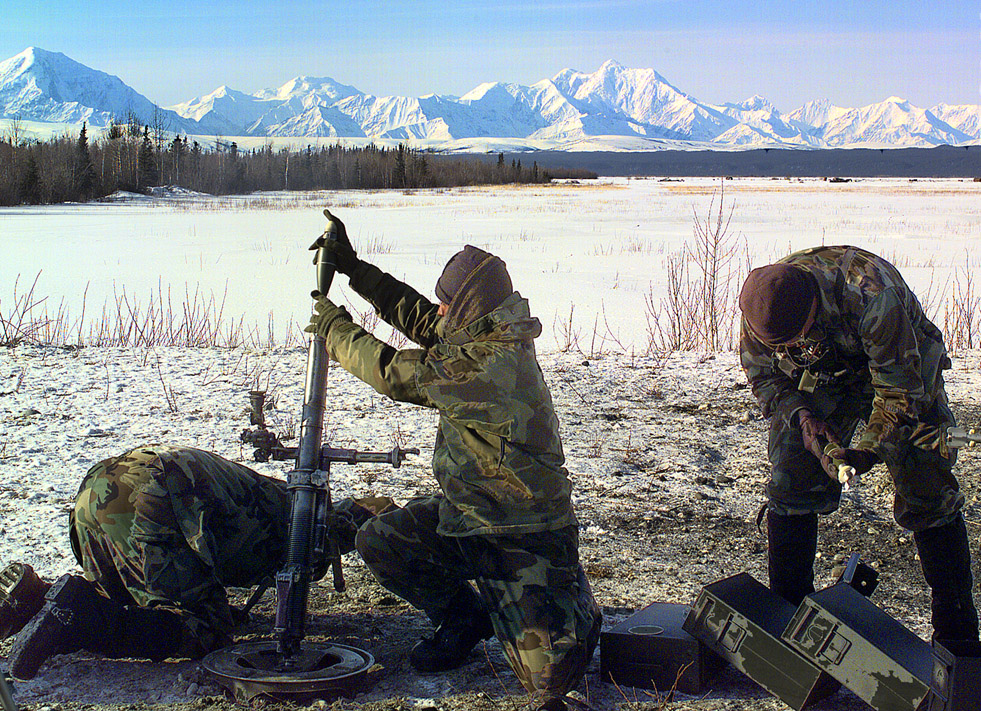 The United States Marine Corps (USMC) began training in the Toiyabe National Forest in 1951 after the Korean War 15th Draft. The Pickel Meadow USMC camp, initially established by Camp Pendleton, was designated the Cold Weather Battalion, Staging Regiment, Training and Replacement Command, to sustain cold-weather training for all Marines going to Korea.
The United States Marine Corps (USMC) began training in the Toiyabe National Forest in 1951 after the Korean War 15th Draft. The Pickel Meadow USMC camp, initially established by Camp Pendleton, was designated the Cold Weather Battalion, Staging Regiment, Training and Replacement Command, to sustain cold-weather training for all Marines going to Korea.
Original military construction in Pickel Meadow started in August 1951 and consisted of temporary buildings and 50 tents for billeting. The facilities included a mess hall and various converted Quonset huts. In May of 1952, the Marine Corps re-designated the Pickel Meadow camp as Cold Weather Battalion, Bridgeport, California, Marine Barracks, Camp Pendleton. The same year, the Seventh Engineer Battalion Fleet Marine Forces constructed permanent buildings to replace the older, temporary structures. Although a number of name changes occurred in the 1950s, by 1963, the facility was known as the Marine Corps Mountain Warfare Training Center (MCMWTC), Bridgeport,  California, and was operated on a year-round basis. MCMWTC was placed in caretaker status in 1967 due to the Vietnam War and was reactivated to a full-time command on 19 May 1976.
California, and was operated on a year-round basis. MCMWTC was placed in caretaker status in 1967 due to the Vietnam War and was reactivated to a full-time command on 19 May 1976.
During the 1980’s, MCMWTC became critically important due to the increased role of Marines in cold weather operations, research & development and operational doctrine. The North Atlantic Treaty Organization’s (NATO) commitment to the defense of northern Europe resulted in annual winter training exercise in Norway. The USMC routinely deployed to Norway with a regimental headquarters and an infantry battalion along with supporting aviation and logistics units. MCMWTC was the venue for preparing Marines for cold-weather operations prior to participating in NATO exercises. It was during this era that the Marine Corps addressed the inadequacies of the 1950s cold weather equipment and began modernization. MCMWTC’s training program also became formalized in the 1980s, resulting in USMC infantry battalions cycling through winter and summer training exercises as part of unit pre-deployment training. The MCMWTC Unit Training Section was established to execute the unit training program. Additionally, the individual training section was further refined, based on the United Kingdom Royal Marine program, and renamed the Mountain Leader Course (MLC). The MLC program produced instructor-qualified military mountaineers and returned them to the Marine Corps operational forces. MCMWTC also developed a mountain and cold-weather survival course and a cold-weather medicine course. The Cold-Weather Medicine course was unique within NATO forces and addressed the peculiar medical problems associated with mountain, high-altitude and cold-weather military operations.
Organization’s (NATO) commitment to the defense of northern Europe resulted in annual winter training exercise in Norway. The USMC routinely deployed to Norway with a regimental headquarters and an infantry battalion along with supporting aviation and logistics units. MCMWTC was the venue for preparing Marines for cold-weather operations prior to participating in NATO exercises. It was during this era that the Marine Corps addressed the inadequacies of the 1950s cold weather equipment and began modernization. MCMWTC’s training program also became formalized in the 1980s, resulting in USMC infantry battalions cycling through winter and summer training exercises as part of unit pre-deployment training. The MCMWTC Unit Training Section was established to execute the unit training program. Additionally, the individual training section was further refined, based on the United Kingdom Royal Marine program, and renamed the Mountain Leader Course (MLC). The MLC program produced instructor-qualified military mountaineers and returned them to the Marine Corps operational forces. MCMWTC also developed a mountain and cold-weather survival course and a cold-weather medicine course. The Cold-Weather Medicine course was unique within NATO forces and addressed the peculiar medical problems associated with mountain, high-altitude and cold-weather military operations.
 The sustained involvement of USMC operational forces in cold-weather exercises and operations led to the partnership between MCMWTC and the Marine Corps Systems Command to further modernize cold-weather clothing and equipment. These efforts led to the establishment of the Extreme Cold Weather Clothing System (ECWCS) that improved USMC tents, packs, sleeping bags and boots.
The sustained involvement of USMC operational forces in cold-weather exercises and operations led to the partnership between MCMWTC and the Marine Corps Systems Command to further modernize cold-weather clothing and equipment. These efforts led to the establishment of the Extreme Cold Weather Clothing System (ECWCS) that improved USMC tents, packs, sleeping bags and boots.
The USMC leadership also committed to the long-term MCMWTC utilization with military construction funding that would span into the 1990s and establish permanent structures in the form of the Upper Base Camp, Lower Base Camp, and Coleville Military Housing. Until 1986, MCMWTC Marine families did not have military housing to live in. A major change occurred with the establishment of Coleville Housing, located 24 miles north of MCMWTC, in 1986.
By the 1990s, the MCMWTC training program was well-established. With the end of the cold war and designation as the Center of Excellence for mountain and cold weather operations, the MCMWTC broadened across the full-spectrum of mountain warfare. Doctrinal revisions were initiated to address all elements of the Marine Air Ground Task Force (MAGTF). Unit training was improved for all elements of the MAGTF. Individual training courses were established to support unit training that included: assault climber’s course, animal packing course, engineer course and communications course. Formal school courses were conducted through summer and winter with three programs: Mountain Leader, Survival, and Medicine. The Mountain Operations Staff Planners Course was conducted every December to support Norway training exercises. The Mountain Scout Sniper Course was established and a Mountain Recon Course was tested. Lessons learned from the Russo-Afghan War were incorporated across the curriculum. The instructor staff increased proficiency in both the tactical as well as technical aspects of mountain warfare.
In the post 9-11 era, operational emphasis shifted away from Korea and Norway- to Afghanistan. However, the high operational tempo and primary focus on Iraq reduced the number of units and Marines training at MCMWTC. In 2008 the USMC was assigned an increased operational mission in Afghanistan and training at MCMWTC and the nearby military bases of Hawthorne and Fallon subsequently increased.
The close relationship of MCMWTC with the Marine Corps Systems Command in all phases of research, development, testing and evaluation of mountain and cold weather specific clothing and equipment continued. The Marine Assault Climber’s Kit (MAC-kit) was fielded in 1996. The MAC kit supported Marine Expeditionary Unit’s requirement for raid companies. The Mountain Cold Weather Infantry Kit (MCWIK) was also fielded.
The lower base camp’s original tent-city was replaced by permanent barracks allowing for thousands of training personnel to experience MCMWTC programs. Personnel from all branches of the U.S. armed forces, as well as from nations such as Britain, Norway, Sweden, Chile, Peru, Israel, Argentina, Netherlands, Kyrgyzstan, Canada, Germany and the United Arab Emerites have completed MCMWTC courses. Instructors from Mountain Leader courses have also deployed to Afghanistan to train the Afghan army. MCMWTC continues to train Marines in the six warfighting functions for combat in complex, compartmentalized, mountainous terrain throughout the world. MCMWTC will continue to prepare Marines, and any military units so directed, for “Every Clime and Place.”
MCMWTC currently conducts six Marine Air Ground Task Force (MAGTF)-level exercises per year, designated the Mountain Exercise (MTX). The purpose of the MTX is to provide a training and limited assessment package that challenges the MAGTF and its subordinate elements to plan and perform operational tasks across the warfighting functions in cold-weather, mountainous environment. The MTX prepares Marine MAGTFs for mountain warfare operations. With MTXs and year-round formal schools and joint forces training, MCMWTC remains a vital component to the training and readiness of the United States Military.
For scenic value, few places can compare to MCMWTC and the surrounding areas. Yosemite National Park’s northern boundary is visible from many points in the training area. Numerous lakes and streams are in and around the base, and the surrounding region is renowned for trout fishing and outdoor recreation. Assignment to MCMWTC is an assignment to an outdoor adventurer’s paradise. Bachelor housing is located at the training center and boasts the best mountain views of any Marine Corps military housing anywhere!
MCMWTC is located on California Highway 108 in the Pickel Meadow of the Toiyabe National Forest. The MCMWTC is 21 miles northwest of Bridgeport, CA, and 100 miles south of Reno, NV. Training occurs within 64,000 acres of the Humboldt-Toiyabe National Forest under management of the U.S. Forest Service and within the bounds of a Special Use Permit. The training elevation ranges from 6,800 feet to nearly 11,500 feet above sea level. Winters are harsh and long, typically providing six to eight feet of snow pack for trainees to maneuver over the snow, on skis, snow shoes, and to build snow shelters. Summers are moderate and breezy, though temperatures often reach into the 90s.
The Legacy Hut is the last Quonset hut on the training center and has been established as a command historical display. The Legacy Hut display is supported by the Marine Corps Mountain Warfare Historical Society (MCMWHS) which promotes an understanding of the military history and tradition of mountain warfare, with emphasis on the historical role of the Marine Corps Mountain Warfare Training Center (MCMWTC). The Legacy Hut is open during normal work days between 0800-1530 by appointment - contact Steve Gardner at 760-932-1454 or Doug Toskin at 760-932-1438 for a tour.